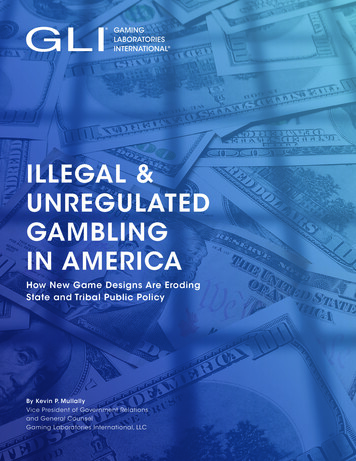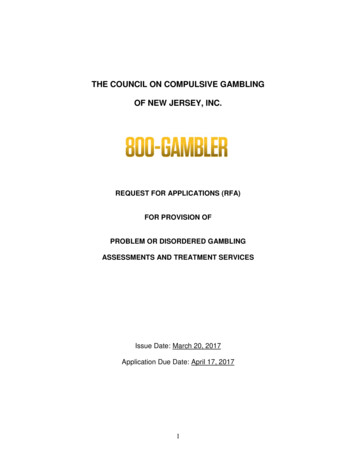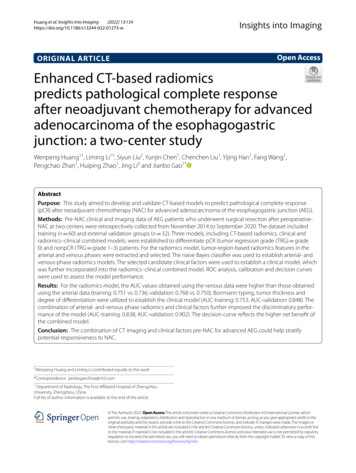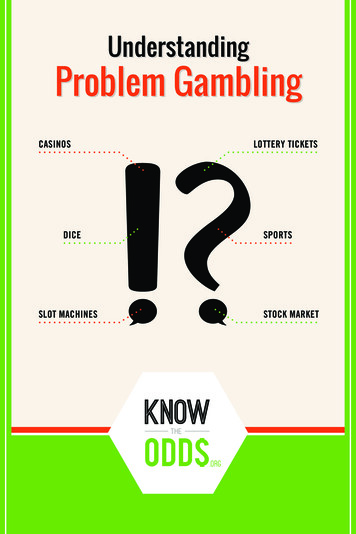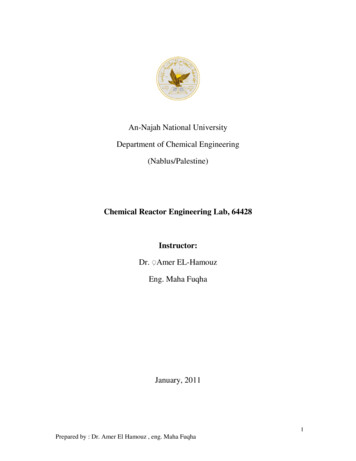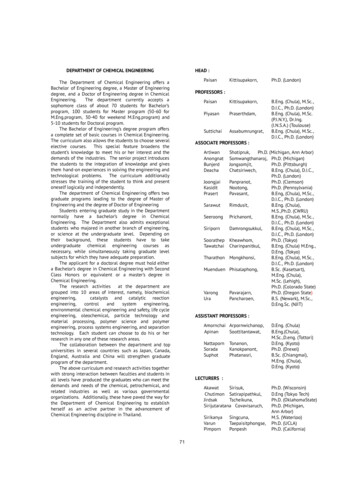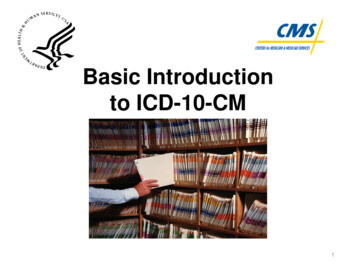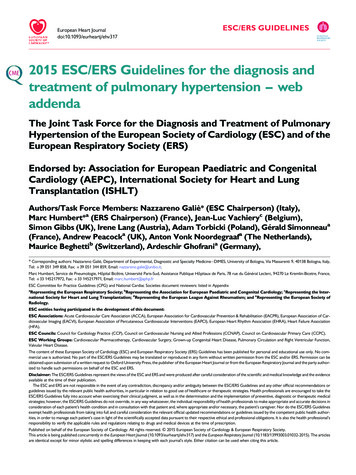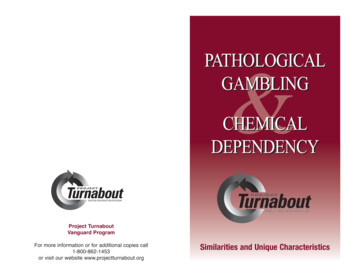
Transcription
PATHOLOGICALGAMBLING&CHEMICALDEPENDENCYProject TurnaboutVanguard ProgramFor more information or for additional copies call1-800-862-1453or visit our website www.projectturnabout.orgSimilarities and Unique Characteristics
Another Chance for LifeVanguard is a residential program that is leading the way inFrom the Authors the treatment of individuals and families experiencing problemsrelated to gambling. This program offers “Another Chance forLife”. TheVanguard Program was awarded “OutstandingContributor in the Field” at the 2006 national conference ongambling.Project Turnabout began operating as a chemical dependencytreatment center in Granite Falls, Minnesota in 1970. Throughthe years, Project Turnabout, a non-profit organization, hashelped thousands of chemically dependent individuals and theirfamilies begin the road to recovery.In 1991, Project Turnabout established theVanguard Programfor the purpose of offering treatment services to pathologicalgamblers and their family members. Vanguard offers aresidential program that is designed to provide the help andhope necessary to make recovery and life-long abstinence fromgambling a reality.The similarities between chemical dependency and pathologicalgambling are reasonably apparent. At one time, pathologicalgamblers were placed in the same groups with chemicallydependent people at Project Turnabout. This practice continueduntil the differences between the two became increasinglyobvious. Pathological gambling is a devastating, unique strainof addiction. This pamphlet will explore some of thesimilarities and unique characteristics.All profits from the sale of this pamphlet are designated to the“Another Chance for Life” fund which helps those in financialneed enter or complete theVanguard Program.Sandi Brustuen, NCGC II, LADCSandi is the Coordinator of the VanguardTreatment Program for pathological gamblersin Granite Falls, Minnesota. She is a pastco-chairperson of the State AdvisoryCommittee for the Gambling Division,Minnesota Department of Human Services,and has presented at numerous state & nationalconferences on the subject of compulsivegambling.Reverend Gabriel previously served asChaplain at Project Turnabout and Vanguard.He has also authored two publications forHazelden “Getting Rid of Resentments” and“Prayer and Meditation.”Reverend Gregory P. GabrielDear Colleague:It is our sincere hope that the enclosed pamphlet will heighten the professionalcommunity awareness of pathological gambling as a growing problem, regionallyas well as nationally.We can be thankful that pathological gambling can be treated successfully andthat treatment is beneficial and rewarding for patients, families and communities.If we can be of assistance to you, please do not hesitate to call.Sincerely,Sandi BrustuenReverend Greg Gabriel
3. Recognizing the risks of pathologicalgambling for those in recovery fromchemical dependency and to allowinformation about gambling to be includedin treatment planning and relapseprevention strategies.It is important for open and frequent discussionamong helping professionals to occur so thatscreening assessment, diagnosis, treatment, andaftercare planning for pathological gambling canbenefit from the past 50 years of experience inhelping individuals and families suffering fromchemical dependency.ReferencesBrowne, Basil R. Really Not God: Secularization and Pragmatismin Gamblers Anonymous. Journal of Gambling Studies 10(3):247260, 1994.Custer, Robert. Characteristics of the Recovering PathologicalGambler: A Survey of 150 Members of Gamblers Anonymous,presented at the Fourth Annual Conference on Gambling, Reno,NV, 1978.Custer, Robert, and Harry Milt. When Luck Runs Out: Help forPathological Gamblers and Their Families. New York: Fact onFile Publications, 1985, p.185.High Stakes: Gambling In Minnesota, St. Paul, MN: MinnesotaPlanning, 1992, p.19.Lesieur, Henry R. Pathological Gambling and ChemicalDependency: Differences, Better Times 3(1):1,3-4, 1994.Psychiatric Illnesses Suffered by Compulsive Gamblers; SuicideAmong Pathological Gamblers; and Compulsive Gambling andFamily Violence. National Council on Problem Gambling FactSheets, New York, NY.Rosenthal, Richard J. Pathological Gambling, Psychiatric Annuals22(2), 1992, p.72-78.Sharing Recovery Through Gamblers Anonymous. Los Angles:Gamblers Anonymous Publishing Inc., 1984, p.201.Stinchfield, Randy D. and Ken Winter. Treatment Effectiveness ofSix State Supported Compulsive Gambling Treatment Programs inMinnesota. University of Minnesota, Minneapolis, MN, 1994.16As opportunities to gamble becomemore available, more sociallyacceptable, and technologically morerapid and exciting, it is very likelythat helping professionals will be faced with thechallenge of diagnosing and treatingpathological gambling. “Pathological gamblingis a treatable disorder; however, it has beenunderdiagnosed by professionals who do notthink to ask about it.” (Rosenthal). Asgambling problems increase, it is clear thatprofessionals will need to ask diagnostic andassessment questions about pathologicalgambling. This is especially true for chemicaldependency professionals, for the co-occurrenceof chemical dependency and pathologicalgambling is frequent (Rosenthal, Custer,Lesieur).The purpose of this pamphlet is to assist thechemical dependency professional and others tobetter understand the similarities betweenchemical dependency and pathological gambling,as well as the unique characteristics ofpathological gambling.Similarities Between ChemicalDependency and PathologicalGamblingBoth chemical dependency and pathologicalgambling are disorders resulting in negativeconsequences for the person and almost alwayshis or her family. Both disorders are describedin the American Psychiatric Association’sDiagnostic and Statistical Manual of MentalDisorders Fourth Edition and have similardiagnostic criteria, including:1
preoccupation with taking and/or seekingsubstances or gambling and/or obtainingmoney to gamble; consuming more of the substance and/ortaking it for a longer period of time thanintended or gambling larger amounts ofmoney and/or over a longer period thanintended; need for an increased amount of thesubstance to achieve intoxication or desiredeffect (tolerance) and/or diminished effectwith continued use of the same amount orincreased size and frequency of bets toachieve the desired excitement; characteristic withdrawal symptoms orrestlessness and/or irritability when attemptingto stop gambling; often takes the substances to relieve and/oravoid withdrawal symptoms or repeated lossof money gambling and returns another dayto win back the losses (“chasing”); repeated efforts to cut down and/or controlsubstance used or cut down and/or stopgambling; given up social, occupational, and/orrecreational activity to seek and/or takesubstance or given up activities to gamble; continuation of substance use despite social,occupational, legal problem and/or physicaldisorder that is exacerbated by continued useof substance or gambles despite inability topay mounting debts.First recognized by the American PsychiatricAssociation in DSM III, the diagnostic criteria forpathological gambling found in DSM IIIR were2financial problems; lack of respite; limitedavailability of Gamblers Anonymous and othermutual support groups; and misunderstanding bysociety. The family members of pathologicalgamblers are also distinguishable from the familymembers of alcoholics--chiefly by their confusion,anger, and the urgent need to protect themselvesfinancially.As gambling opportunities have increased, problemsrelated to gambling including pathological gamblinghave also increased. There are clear similaritiesbetween pathological gambling and chemicaldependency in terms of both diagnostic criteria andtreatment planning.There are also unique characteristics of pathologicalgambling that must be considered and addressed.Chemical dependency professionals have much tooffer the emerging field of treatment for personsexperiencing gambling problems.Chemical dependency professionals have animportant role to play in responding to personsexperiencing problems related to pathologicalgambling. There is a strong correlation betweenchemical dependency and pathological gambling. Asmany as one-third of pathological gamblers may alsobe chemically dependent.Chemical dependency professionals can offerimportant services by:1. Asking questions about gambling behaviorduring diagnostic interviews. The SouthOaks Gambling Screen (SOGS) can be ahelpful instrument to assess the probability ofgambling problems.2. Talking with colleagues specializing intreating pathological gamblers to enhanceeveryone’s capacity to make appropriatereferrals and/or provide practical andhelpful treatment services.15
The Need to Move Quickly to Protect FamilyAssetsThe family members of an alcoholic might becounseled to “detach with love” from the alcoholic intheir life, which is a way of saying that they are notto take emotional responsibility for the alcoholic. Ifthe alcoholic has a history of being physicallyabusive, the family might be advised to take steps tosafeguard their own physical well-being. Wherepathological gambling is concerned, however, thefirst priority is for the family to take measures toprotect its financial assets.If the pathological gambler and spouse have a jointbank account, or if both of their names appear oncredit cards, it is imperative that the spouse of thepathological gambler move swiftly to protect himselfor herself financially. Usually, the spouse will needto take over all of the financial management of thefamily, as money is the substance of abuse for apathological gambler.Healing Support NeededThe family members of pathological gamblers canexpect to find less support than the family membersof alcoholics. Al-Anon groups are plentiful, butGam-Anon groups are few. Some family members ofpathological gamblers seek support at Al-Anon eventhough the program is not expressly for their needs.SummaryAs the problem of pathological gambling gainsgreater recognition in society, people are beginningto understand and appreciate how it is similar to anddiffers from the more familiar problem ofalcoholism. Pathological gambling is marked by itssecrecy, its swift progression, and by the cripplingshame of the person afflicted with the disease. Thereare several other qualities of pathological gamblersthat might set them apart from alcoholics, as conomic background; deceit; restlessness;14intentionally patterned after those for substancedependence (Rosenthal). The following chartcompares current DSM IV diagnostic criteria forpsychoactive substance dependence and pathologicalgambling.Psychoactive Substance DependenceA maladaptive pattern of substance use,leading to clinically significant impairment ordistress, as manifested by three (or more) ofthe following, occurring at any time in thesame 12-month period:1. tolerance, as defined by either of the following:a. a need for markedly increased amounts ofthe substance to achieve intoxication ordesired effectb. markedly diminished effect with continueduse of the same amount of the substance2. withdrawal, as manifested by either of thefollowing:a. the characteristic withdrawal syndrome forthe substance (refer to Criteria A and B of thecriteria sets for withdrawal from the specificsubstances)b. the same (or a closely related) substance istaken to relieve or avoid withdrawal symptoms3. the substance is often taken in larger amountsor over a longer period than it was intended4. there is a persistent desire or unsuccessfulefforts to cut down or control substance use5. a great deal of time is spent in activitiesnecessary to obtain the substance (e.g.,visiting multiple doctors or driving longdistances), use the substance (e.g., chainsmoking), or recover from its effects6. important social, occupational, or recreationalactivities are given up or reduced because ofsubstance use7. the substance use is continued despiteknowledge of having a persistent or recurrentphysical or psychological problem that is likelyto have been caused or exacerbated by thesubstance (e.g., current cocaine use despiterecognition of cocaine-induced depression, orcontinued drinking despite recognition that anulcer was made worse by alcohol consumption)Pathological GamblingPersistent and recurrent maladaptive gamblingbehavior as indicated by five (or more) of thefollowing:1. is preoccupied with gambling (e.g.,preoccupied with reliving past gamblingexperiences, handicapping or planning thenext venture, or thinking of ways to get moneywith which to gamble)2. needs to gamble with increasing amounts ofmoney in order to achieve the desiredexcitement3. has repeated unsuccessful efforts to control,cut back, or stop gambling4. is restless or irritable when attempting to cutdown or stop gambling5. gambles as a way of escaping from problemsor of relieving a dysphoric mood (e.g., feelingsof helplessness, guilt, anxiety, depression)6. after losing money gambling, often returnsanother day to get even (“chasing” oneʼslosses)7. lies to family members, therapist, or othersto conceal the extent of involvement withgambling8. has committed illegal acts such as forgery,fraud, theft, or embezzlement to financegambling9. has jeopardized or lost a significant relationship,job, or educational or career opportunitybecause of gambling10. relies on others to provide money to relieve adesperate financial situation caused bygambling3
Unique Characteristics ofPathological Gambling“Because theirThe similarities between pathological gambling andchemical dependency are clear.similarities were soapparent, our treatmentcenter put pathologicalgamblers into the samegroup with chemicallydependent people. Theexperiment floundered,however, largelybecause the differencesAs the problem of pathological gambling emergesfrom the shadows, it becomes apparent that it is aunique strain of addiction. Its own subtle identity isonly beginning to make itself known. It is difficult tomaintain that pathological gambling is utterly unique-but there does seem to be some distinctive featuresabout this addiction.between the two typesof addiction were sopronounced, the groupnever congealed. Overtime, the distinctionsbetween pathologicalgamblers andalcoholics only becamemore manifest. We alsosought to bring togetherthe family members ofboth groups of patients,for their mutual support.Their family issues alsoseemed to divergeradically. For all of thecharacteristics thatpathological gamblingand alcoholism mighthave in common, theirGiven these similarities, why focus attention on thedifferences between pathological gambling andchemical dependency? While the problem ofalcoholism and chemical dependency has beenstudied and discussed for decades, the problem ofpathological gambling is only beginning to berecognized as something unique. As people start tounderstand pathological gambling as a problemdistinct from alcoholism (and other forms of chemicaldependency) they will be able to respond to it moreappropriately.This section will describe some conclusions drawn byprofessional counselors who have dealt with theproblem of pathological gambling and somegeneralizations from those who have struggled withtheir own addiction to gambling.differences arecompelling.”Chemical DependencyProgram Director4SecrecyPathological gambling is an insidious addiction.Alcohol intoxication is observable. The behavior ofan intoxicated person is easily recognized and alcoholconcentration can be measured with a breathalyzer orblood test. However, a gambling problem is moredifficult to detect.one while in treatment, but the family members of apathological gambler often just begin to uncoverproblems while their loved one is in treatment.AngerThe family members of pathological gamblerscommonly experience anger or rage when the depthsof their financial losses, due to gambling, aredisclosed during treatment. Unlike the families ofalcoholics in treatment, they exhibit tremendoushostility, almost a vengeful indignation. “What doyou mean you did not pay the income taxes inApril?” a man bellowed at his wife. “How could youdo this to me?”The revelation of financial loss can be devastating toa family, and their natural recourse is great anger.The family members of a pathological gambler oftensustain financial damage that is greater than thedamage an alcoholic inflicts on his or her familythrough auto accidents, DWIs and loss ofemployment. “Don’t tell me about any disease!”thundered a wife of a pathological gambler. “That’sjust an excuse!”A study of violence in families where pathologicalgambling is a factor found that only 11 percent ofpathological gamblers were physically abusivetowards their spouses (compared to the nationalaverage of 28 percent) but that 61 percent of thespouses of pathological gamblers reported that theyhad either hit or thrown objects at the pathologicalgambler in their family (National Council onProblem Gambling). These data would seem to pointto the explosive anger that is engendered in thefamily members of pathological gamblers. Thefamily members of alcoholics may have reason tofear violence from their alcoholic, but the familymembers of a pathological gambler seem to be morelikely to perpetrate the violent acts.13
that have been affected by pathological gamblingfrom families impacted by chemical dependency: 1)confusion; 2) anger; and 3) the need to move quicklyto protect family assets.“When thefamily members of apathological gamblercome to treatment, theysometimes appear to bein shock. ʻWhat do youmean we no longer ownthe farm?ʼ “Wife of apathological gamblerConfusionDue to the secrecy that attends pathologicalgambling and the swift progression of the disease,the family members of pathological gamblersfrequently do not comprehend what is happening.They might sense that something is amiss, and yetnot know exactly what it is. Pathological gamblingtakes the family by surprise with the samesuddenness that it descends upon the pathologicalgambler. The children of an alcoholic might knowwhat the problem is--their mother or father comesstumbling home drunk--but the children of apathological gambler might not have a clue as towhat is wrong.Since family members are seldom aware of thepathological gambling of their loved one, they areoften unable to change any of their own behavior thatmight be contributing to or enabling the gambling.Unlike the spouse of an alcoholic who willsometimes actively work to cover up intoxicatedbehavior, the spouse of a pathological gambler mayhave no knowledge of any problem until secrecy of afinancial or legal disaster is discovered.The family members of an alcoholic tend to beeffective caretakers, but family members of apathological gambler are frequently cared for by thepathological gambler. The husband of a pathologicalgambler, therefore, is sent reeling when his wifeinforms him that she has gambled away the moneythey had set aside for their retirement. He is dazed,confused and feels betrayed.The family members of an alcoholic might begin toresolve their differences with their alcoholic loved12By the time a person’s alcoholism has gotten out ofcontrol, a lot of other people seem to know about it.Pathological gambling, on the other hand, is ofteneasier to conceal. Pathological gamblers seem tohave a knack for looking good until they get verynear their bottom. Pathological gamblers have beenknown to rent secret post office boxes to keep theirfinancial dealings away from their spouses, to usefictitious names on their bank accounts, or to hideextra cash in their shoes when they accompany theirspouse to a casino.“Slurred speechis evidence ofdrunkenness, but howcan you tell ifsomeone has ʻmaxedoutʼ a credit card tosupport a gamblinghabit?Drunken drivers oftenget into car accidents,Usually, it is not difficult for a chemical dependencyprofessional to obtain information from familymembers when conducting a chemical dependencyassessment. Just the opposite occurs when doing aproblem gambling assessment. In many cases,family members have no relevant informationbecause the gambling has been kept a secret. Manyalcoholics hide their drinking rather effectively, too,but it does not seem to compare with the stealth thatattends pathological gambling. It is easier to hidemoney than alcohol.SwiftnessPathological gambling is often characterized by asudden decline. A person with alcoholism mightappear to manage drinking for 15 years before thedrinking becomes an overwhelming problem, but thedemise of a pathological gambler might take lessthan a year. Pathological gambling runs its coursevery quickly, especially when compared to theprogression of alcoholism.but who would knowthat an officesecretary isembezzling fundsfrom a business, andthen slipping out to acasino on her lunchhour?”Spouse of a RecoveringPathological Gambler“When I wasin treatment forcompulsive gambling,I remember mycounselor stoppingme in my tracks oneday with the question:ʻWhen are you goingPathological gambling has been compared to a fastmoving train. The typical bar scene is “laid back”compared to the frenzied pace of a casino. Gambling isa fast-paced pastime. One pathological gambler intreatment remembered that he had gotten soproficient at pull tabs that he could do three cards atthe same time.to stop running?ʼ It isa question of deepimportance for acompulsive gambler.”Recovering PathologicalGambler5
C“ounselors whowork with pathologicalgamblers observe thatAn integral part of treatment for pathologicalgamblers is helping people to slow down.Pathological gamblers in treatment frequently dotheir reading and writing assignments very quickly,or even work ahead of schedule. It is singularlyimportant for pathological gamblers to acquirepatience if they hope to arrest their fleet-footedenemy.those who entertreatment almost seemto be in a state ofʻshockʼ during their firstweeks of treatment.They are overwhelmedby their addiction sosuddenly that they aregiven to wondering,ʻWhat happened?ʼ If thestandard length ofprimary inpatienttreatment for alcoholismis about 28 days,pathological gamblingmay require an extrafew weeks of treatmentto allow for recoveryShamePathological gamblers tend to have a particularlywounded sense of self. Typically, they haveexperienced severe rejection from their parents,abandonment, sexual abuse, or other traumas thathave reinforced their feelings of inadequacy in apowerful way. Pathological gamblers are prone todepression and suicide. One hospital that treatedpathological gamblers found that 76 percent hadstruggled with major depression and that 24 percenthad attempted suicide (National Council on ProblemGambling). In a Minnesota study of treatmenteffectiveness, 45% of pathological gamblersreported prior use of mental health services(Stinchfield and Winters).from the initial daze.”Pathological GamblingTreatment ProgramDirectorThere is an interesting idiosyncrasy that separatespathological gamblers from alcoholics: pathologicalgamblers often perceive alcoholics as “blamers.”While alcoholics might hold others responsible fortheir lot, pathological gamblers are more likely toconclude that they have no one to blame butthemselves, and are very susceptible to shame, guilt,and depression.The secrecy, swiftness, and shame we have observedwhile working with people affected by pathologicalgambling are consistently noticeable characteristics.In addition, we have observed other characteristicsthat often seem to be identifiable among pathologicalgamblers.6In addition, there are fewer GA groups than AAgroups in most communities.No RespiteThe pathological gambler knows no respite except inthe gambling action itself. One pathological gamblerremembered sweating in desperation as he slept atnight. The pathological gambler’s entire being wascaught up in the vicious cycle. There is no reprievefor the pathological gambler other than continuing togamble.Misunderstood by SocietyAnother important difference between pathologicalgamblers and alcoholics, is that there aresignificantly fewer pathological gamblers in thiscountry. A statistic that is cited rather commonly isthat about 10 percent of the populace in this countryis alcoholic/chemically dependent. A 1994 studydone in Minnesota, on the other hand, found thatonly about 1.2 percent of the population could beconsidered probable pathological gamblers.“It is interesting tonote that manyrecovering alcoholicsare not aware thatthey might be at riskof crossing over topathologicalgambling.”Many pathological gamblers have lamented thattheir addiction carries a greater stigma than chemicaldependency. On the whole, there is lessunderstanding, tolerance and support in society forrecovering pathological gamblers. While gamblingitself might be socially acceptable, pathologicalgambling is misunderstood or considered to be a vicerather than an illness. Medical insurance may covertreatment for chemical dependency, but seldomcovers treatment for pathological gambling.Chemical Dependency andPathological GamblingCounselorDifferences in FamiliesJust as pathological gamblers seem to differ fromalcoholics, so the families of pathological gamblersdiffer from the family members of alcoholics. Threethings can be observed which distinguish families11
Available SupportGamblers Anonymous (GA) is based on principlessimilar to Alcoholics Anonymous (AA) and both aremutual help groups guided by 12 Steps. However,there are some distinctions between the programs.GA does not stress God and spirituality in the sameway as AA. Comparing the 12 Steps of each groupoffers an example of some of the differencesbetween GA and AA.Alcoholics Anonymous10Gamblers Anonymous1. We admitted we were powerless overalcohol--that our lives had becomeunmanageable.1. We admitted we were powerless overgambling--that our lives had becomeunmanageable.2. Came to believe that a Power greaterthan ourselves could restore us tosanity.2. Came to believe that a Power greaterthan ourselves could restore us to anormal way of thinking and living.3. Made a decision to turn our will and ourlives over to the care of God as weunderstood him.3. Made a decision to turn our will and ourlives over to the care of this Power ofour own understanding.4. Made a searching and fearless moralinventory of ourselves.4. Made a searching and fearless moraland financial inventory of ourselves.5. Admitted to God, to ourselves, and toanother human being the exact natureof our wrongs.5. Admitted to ourselves and to anotherhuman being the exact nature of ourwrongs.6. Were entirely ready to have Godremove all these defects of character.6. Were entirely ready to have thesedefects of character removed.7. Humbly asked Him to remove ourshortcomings.7. Humbly asked God (or our understanding) to remove our shortcomings.8. Made a list of all persons we hadharmed, and became willing to makeamends to them all.8. Made a list of all persons we hadharmed and became willing to makeamends to them all.9. Made direct amends to such peoplewherever possible, except when to doso would injure them or others.9. Made direct amends to such peoplewherever possible, except when to doso would injure them or others.10. Continued to take personal inventoryand when we were wrong promptlyadmitted it.10. Continued to take personal inventoryand when we were wrong, promptlyadmitted it.11. Sought through prayer and meditation toimprove our conscious contact with Godas we understood Him, praying only forknowledge of His will for us and thepower to carry that out.11. Sought through prayer and meditationto improve our conscious contact withGod as we understood him, praying onlyfor the knowledge of His will for us andthe power to carry that out.12. Having had a spiritual awakening as theresult of these steps, we tried to carrythis message to alcoholics, and topractice these principles in all ouraffairs.12. Having made an effort to practice theseprinciples in all our affairs, we tried tocarry this message to other compulsivegamblers.ControlMany pathological gamblers tend to be extremelycontrolling people. Some actually come to believethat they can control a video poker machine.Consider how much control is wrapped up in thedetermination to beat the odds of a pull-tab orlottery ticket, to influence the roll of the dice or thecards dealt, or to predict the outcome of a horse race.This desire to be in control is evident in treatmentwhen some clients attempt to restructure schedulesor other aspects of treatment.IntroversionPathological gamblers are often introverts. Aworking definition of an introvert is someone whoexpends energy in the presence of other people--asopposed to an extrovert who draws energy fromothers. A pathological gambler might come across asa personable, outgoing sort, but the deeper the truthis that he or she is more comfortable when alone.“Pathologicalgamblers are used tobeing in charge.Once, when Iattempted to make anappointment with apathological gambler,Pathological gambling is an isolating activity--not asocial activity--so it appeals to introverts. Apathological gambler would rather be absorbed in avideo poker machine, or concentrating on a cardgame, than engaged in conversation.he questioned methoroughly as to howour engagementwould affect thevarious other aspectsof my daily schedule.In other words, heSocializing itself often becomes a treatment issue forpathological gamblers. They are likely to be foundsitting on a couch alone, reading, or listening tomusic with headset, or even sleeping. For thepathological gambler, socializing can be difficult.was worrying aboutmy schedule on mybehalf.”CounselorIntellectualizingPathological gamblers tend to be bright, fairly welleducated people, many of them from the ranks ofprofessionals. Despite the intelligence of manypathological gamblers, they often engage inirrational thinking.7
A pathological gambler’s mind seems to be workingovertime, whether
Chemical dependency professionals have an important role to play in responding to persons experiencing problems related to pathological gambling. There is a strong correlation between chemical dependency and pathological gambling. As many as one-third of pathological gamblers may also be chemically dependent. Chemical dependency professionals .

